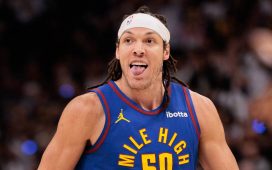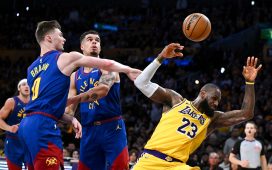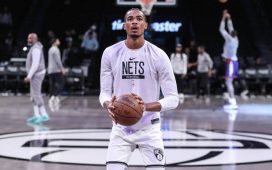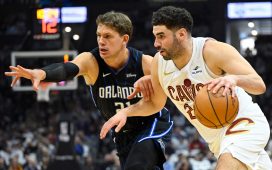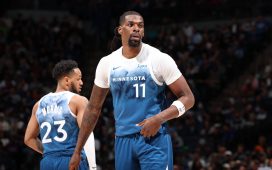This was in the Lakers’ locker room at the fieldhouse in Indianapolis, Jan. 27, 2010, and pardon the fuzzy memory here, but I don’t recall if it was before or after the game. But I knew Kobe Bryant had a friendship and a special kinship with Peyton Manning, his kindred spirit on the football field.
As he spoke, I began to understand the uncomplicated why of athletic transcendence.
“He’s phenomenal,” Bryant told a small group of reporters that night. “It’s funny, I texted him (Manning), I told him every time I watch him play, I come away from the game thinking, ‘I don’t prepare for shit.’ That guy is incredible.”
Then he got to the root of it.
“It stems from the fact we both love what we do,” Bryant said. “We genuinely love it. It’s not like you’re working. You have this curiosity about your profession that may be different than your peers, and as a result you get better. We’re constantly looking for ways to improve.”
Earlier that day, I spoke with Manning about Bryant.
“Your best work is done in the offseason,” Manning said. “I’ve seen clips of Kobe working on a hook shot this offseason with Hakeem Olajuwon. Guys like him try to add something new and try to perfect it.”
Greatness begins at the molecular level, with God-given athleticism. If a maniacal work ethic was all that was required, we’d be overrun with Kobes and Peytons. Everybody wants to be great. What set Kobe and Peyton apart, though, was an insatiable hunger to perfect the craft, a cellular craving for victory and a willingness to pursue excellence with a work ethic and commitment that was almost without equal.
Manning shared a statement Sunday:
“I am incredibly saddened by the tragic news of Kobe Bryant’s passing. I always appreciated Kobe’s talent, work ethic and competitiveness. Most of all, I appreciate his friendship he was a friend and we worked together recently on several projects. I was honored to be asked by Kobe to be part of his “Detail” show and really enjoyed our interactions over the years. We retired at the same time and had to make that transition together. I am so shocked and saddened. My prayers are with the Bryant family and all the families of everyone involved. I will miss Kobe very much, just like so many will. It’s just an incredibly sad day.”
As I drove home Sunday from IU’s loss to Maryland — don’t ask — I listened to talk radio and heard Syracuse coach and former Olympic assistant coach Jim Boeheim.
He didn’t just talk about Bryant’s singular work ethic, which he saw firsthand as an assistant coach on the “Redeem Team,” the Team USA men’s basketball squad at the 2008 Olympics. He didn’t just talk about how Bryant worked out two and even three times a day during a slow time in the summer, when most players are just cruising. What he talked about was how Kobe showed the young NBA stars on the Olympic team how to work and prepare for the international stage. While other, lesser players might have gone through the motions during practices before an Olympic qualifier, Bryant treated every possession like the most important possession of his life. He raised everybody’s level of passion and performance, and he did it through sheer will.
The “Mamba Mentality,” indeed.
Bryant said it beautifully, poetically in his 2015 letter to the game entitled “Dear Basketball.”
“I played through the sweat and the hurt, not because challenge called me but because you called me,” he wrote. “I did everything for you because that’s what you do when someone makes you feel as alive as you’ve made me feel.”
Peyton could have written that. Or Michael Jordan. Or Wayne Gretzky. Or Simone Biles. Or Tiger Woods. The challenge never stops. The joy never wavers. The curiosity never dims.
Nor will the memory of Kobe Bean Bryant.
Maryland’s basketball team had just escaped Bloomington with a remarkable, come-from-behind victory Sunday. It was a win that was so emotional, Maryland coach Mark Turgeon had to sprint across the court at game’s end to calm down his player, Jalen Smith, who was taunting IU fans.
Afterward, Turgeon apologized for his player’s actions, and Smith himself stepped up and conceded that emotions got the best of him, and he was in the wrong.
As Smith spoke, his teammate, Aaron Wiggins stood a few feet away, and after answering some questions about Maryland’s late comeback victory, he was asked about the terrible news.
“They told us after we prayed (in the locker room),” he said, his expression changing. On his official school bio, he lists Kobe Bryant as his sports hero. “That hurts. Every guy in that locker room would tell you they looked up to Kobe. Somebody like him, he seems untouchable.
“Everything I do (is because of Bryant). I’ve always tried to copy his game. It hurts. It hurts.”
Every generation has its Guy. My generation had Magic and Larry, taking the NBA off taped delay and helping turn the league into a significant part of the American sporting landscape. The next generation had Michael. And then there was Kobe, who ultimately passed the torch to Lebron, who will someday pass it on to … we’ll find out. Maybe Zion Williamson? Maybe Ja Morant? Luka Doncic?
For Archie Miller, IU’s coach, the news hit hard. First, because he learned about it less than a minute before he walked into the postgame press conference, but also because both are Pennsylvania guys and Bryant once played for Miller’s father, John, in a McDonald’s All-American game.
“… I’ll be honest with you, as sick as I am about the game … I know Kobe Bryant,” Miller said. “He was a year older than me in high school … I mean, like that can’t be real. That’s the most sick, stunning thing that’s happened … It would have been like Michael Jordan passing away at 40 years old. It makes no sense.
“I guess, if there’s a silver lining here, man, you look at your players, and you know it’s not the end of the world, obviously, that we lost this game when you really think about what’s really going on out there at times for other people. Keep it in perspective a little bit.
“… It’s just, you know, I don’t know how to really equate it to our youth. In my youth, it would have been Michael Jordan and maybe in older generations, maybe some rock stars, but that’s just a sick, sick feeling, sick, sad feeling for a lot of people around the world, really.”
The sports world lost a generational icon.
Here in Indianapolis, there once existed a sort of love/hate relationship with Kobe.
The hatred?
He took away Indy’s one and only chance to win an NBA title in 2000 when the Pacers and Lakers hooked up in the Finals. You remember: He was injured in Game 2, missed Game 3 and then returned for Game 4. Never mind the fact that Shaquille O’Neal had fouled out; Bryant, still struggling with the ankle, scored 22 second-half points and single-handedly led the Lakers to an overtime victory that gave them a 3-to-1 series lead, a series they would go on to win in six games.
In that moment, Bryant truly forced his way into the American consciousness and never looked back. We saw the dawn of a legend here in Indy.
So hate? Yes.
But love? Yeah, that too.
Because Indiana bleeds the game of basketball, venerates it, and can fully appreciate a player who loves and reveres the game like we do. And so it happened that at Kobe’s last game in Indianapolis, Feb. 8, 2016, Bryant left us with one more indelible memory, and it felt just right.
By then, he was running on fumes, playing out the string for a lottery-bound Lakers team, and all that was left was to celebrate the looming finish to an extraordinary career. He started the game missing 14 of his first 16 shots, including an air ball that may have crossed state lines. He even went up for a perfunctory layup, only to eschew the dramatic dunk and softly roll it over the front of rim. It didn’t seem right.
“Hilarious,” Bryant said later. “I was going to lay it up off the glass and then I see (C.J.) Miles trying to do a little chase down and I’m like, ‘Oh, shit. God, I don’t feel like jumping.’ Just wanted to do the bare minimum. It was a two-hand finger roll.”
But with 4:13 left in the game, Bryant turned back the clock and went on a circa-early-2000s tear. He hit a short jumper. He made a contested 3-pointer in Paul George’s mug. There was another 3-ball. And another triple. He scored 11 straight points, and the fieldhouse crowd, many of whom came specifically to pay their respects to Kobe, began chanting: Kobe! Kobe! Kobe!
It was snowing and frigid in Indy that night, but inside, it might as well have been balmy Los Angeles, minus the celebrity fans. The multitudes chanted his name every time the Lakers possessed the ball, and even booed and attempted to distract George when he went to the free-throw line. It wasn’t so much a mutiny as it was the highest form of respect for an all-time great.
In the end, the Pacers would pull out a two-point victory. And nobody cared. Kobe had graced us with one final glimpse of the past.
“I pulled a rabbit out of a hat,” Bryant said. “And then the rabbit disappeared.”
Indy hated Kobe. And then Indy came to grudgingly appreciate his greatness, even at the Pacers’ expense. That February day in 2016, they loved and celebrated him, the cheers echoing long into the night. Today, they mourn his passing, the passing of his daughter Gianna and the other people who perished in the crash. He still had so much to offer after having made the seamless transition to post-basketball life.
It’s all just so unspeakably sad.
(Photo of Bryant and George on Feb. 8, 2016: Brian Spurlock / USA Today)
